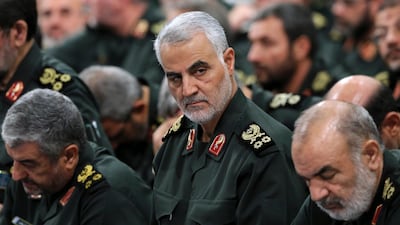UPDATE: Qatari hostage payments funded Al Qaeda group that is now Syria’s most powerful militant faction
A ransom deal involving Qatar, Iraq, Iran, Turkey and Syria could end up having implications for Washington, after it was reported that huge sums of cash went straight into the pockets of some of the US's most ardent foes in Iraq.
According to the Washington Post, Qatari officials in April of 2017 appeared "to consent to payments totaling at least $275 million (Dh1 billion) to free nine members of the royal family and 16 other Qatari nationals" who were kidnapped during a hunting trip to Iraq. The secret exchanges between Qatari officials and intermediaries revealed that $150m more than was previously reported was paid, much of it to groups and leaders designated by the US government as terrorist actors.
Recipients of up to $75m included leaders from Iran's Islamic Revolutionary Guard Corps (IRGC), Iraq's Kataib Hezbollah and Jabhat Fateh Sham, formerly known as Jabhat Al Nusra, which is linked to Al Qaeda. Kataib Hezbollah was designated by the US government as a terrorist entity in 2009, and Jabhat Al Nusra in 2012. US President Donald Trump put the IRGC under terrorism designation last October. Some of the cash also went to senior IRGC leader Qassem Soleimani, who was designated a terrorist in 2011, The Washington Post reported.
A US State Department official asked about the deal told The National "we understand that the [25] hostages were freed.
“We have no additional comment beyond referring you to the governments of Iraq and Qatar.”
Phillip Smyth, a fellow at the Washington Institute for Near East Policy, who closely monitors Shia armed groups in the region, said that some of the militias involved in the deal are among the most aggressive in targeting the US. "Kataib Hezbollah is a registered US terror group and one of the most outwardly aggressive organisations when it comes to messaging and actions," Mr Smyth told The National.
"It's important to remember that the group targeted US forces during the Iraq war with advanced weapons, continues to threaten US interests, has backed materially and politically Bahraini Shia militants....so its involvement with IRGC in the deal means quite a bit" he said.
_________
Read more
‘I felt like life was beginning again’: Qataris kidnapped in Iraq speak of joy at release
Iraq says it still has Qatari money sent to free ruling family members
_________
What could be more troubling for the US, Mr Smyth said, is “it shows that some Gulf states, in this case, Qatar, are willing to act unilaterally despite US issues with these actors.
“This was an entire incident that appears to have not involved the US despite its much broader geopolitical implications, particularly the potentially more negative ones for Washington.”
The other troubling aspect for the US government is the intricacies and factions revealed in the deal.
“It shows that on an organisational level, an extremely anti-US group like Kataib Hezbollah may be more factionalised ... which could be cause for concern for US forces in Iraq.
“It also demonstrates how the Iranians could potentially use these now confusing networks against the US and its interests in the region,” he said.
The cash that went to Kataib Hezbollah from the ransom deal is almost five times the group's annual budget ($2m to $6m) for its fighters, said Mr Smyth.
More broadly, the deal goes against America's longstanding policy reaffirmed under successive governments of refusing to make concessions or pay ransom to terrorist groups.

